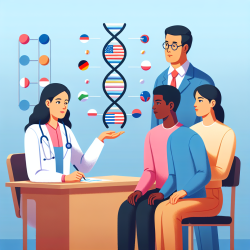Introduction
Genetic counseling and testing are crucial components of modern healthcare, especially for prenatal care. However, these services are often underutilized by ethno-cultural minorities, leading to a gap in effective healthcare delivery. A recent qualitative study titled "Challenges to effective and autonomous genetic testing and counseling for ethno-cultural minorities: a qualitative study" sheds light on the barriers faced by minority groups, particularly the Arab population in Israel, in accessing genetic counseling services. This blog explores how practitioners can improve their skills and enhance service delivery by implementing the study's findings.
Understanding the Barriers
The study identifies several barriers that hinder the effective utilization of genetic counseling among ethno-cultural minorities. These include:
- Lack of Knowledge: Many individuals from minority groups are unaware of the goals and benefits of genetic counseling, leading to misconceptions and negative preconceptions.
- Miscommunication: There is a significant gap in communication between healthcare providers and counselees, often due to cultural and language differences.
- Cultural Misunderstandings: Different cultural and religious beliefs can influence attitudes towards genetic testing and counseling, resulting in distrust and reluctance to participate.
Strategies for Improvement
To address these challenges, healthcare practitioners can adopt the following strategies:
- Enhance Cultural Competence: Practitioners should strive to understand the cultural and religious beliefs of minority groups. This includes respecting their perspectives and incorporating cultural sensitivity into counseling sessions.
- Improve Communication: Use clear and simple language to explain genetic risks and counseling processes. Consider employing translators or cultural liaisons to bridge language gaps.
- Community Outreach: Conduct educational workshops and seminars to raise awareness about the benefits of genetic counseling. Engaging community leaders can help build trust and encourage participation.
Empowering Autonomy
One of the key goals of genetic counseling is to empower counselees to make informed decisions autonomously. By understanding and addressing cultural barriers, practitioners can create a supportive environment that respects the autonomy of individuals from minority groups.
Encouraging Further Research
The findings of this study highlight the need for ongoing research into the unique challenges faced by ethno-cultural minorities in accessing genetic counseling. Practitioners are encouraged to engage in further research to develop tailored interventions that address these challenges effectively.
To read the original research paper, please follow this link: Challenges to effective and autonomous genetic testing and counseling for ethno-cultural minorities: a qualitative study.










